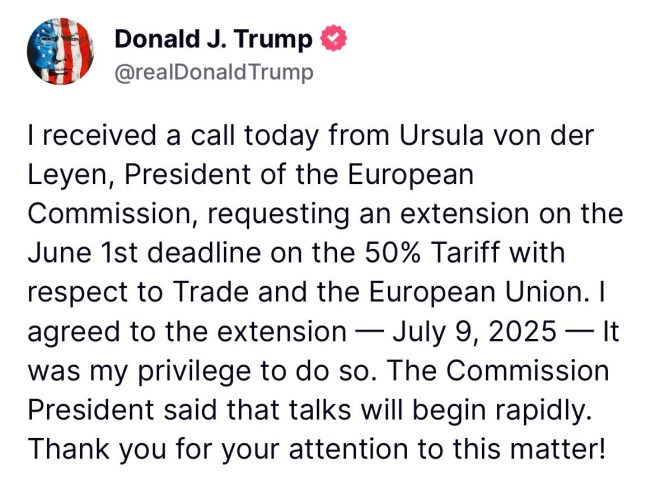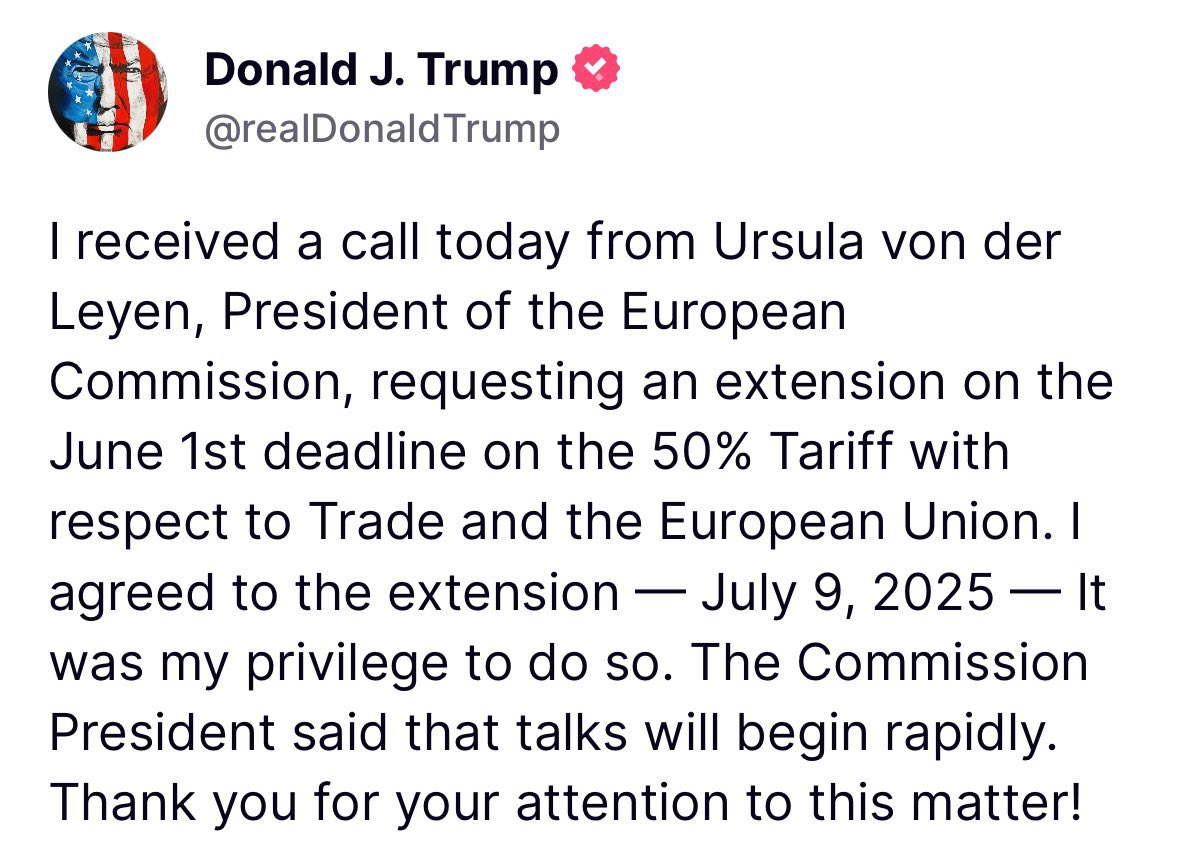
President trump Delays EU Tariff: Key Details and Implications
On May 25, 2025, President Donald Trump announced a significant delay in the implementation of a proposed 50% tariff on goods imported from the European Union (EU). Originally set to take effect on June 1, the tariff will now be postponed until July 9. This decision came after a phone conversation between President Trump and the President of the European Commission, signaling a potential for diplomatic dialogue amidst ongoing trade tensions.
Background on the Tariff Announcement
The proposed 50% tariff on EU goods has been a contentious topic in international trade discussions. It was initially introduced as part of the Trump administration’s broader trade strategy aimed at addressing what the administration perceives as unfair trade practices by the EU. The tariff was expected to impact a wide range of products, potentially leading to increased prices for consumers and businesses in both the United States and Europe.
Reasons for the Delay
The postponement of the tariff is seen as a strategic move by the Trump administration to allow for further negotiations with European leaders. The call with the President of the European Commission suggests a willingness to engage in dialogue rather than escalate trade tensions. This delay may also reflect concerns over the potential backlash from American consumers and businesses that could face higher prices due to the tariffs.
Implications for U.S.-EU Trade Relations
The delay in the tariff implementation has several implications for U.S.-EU trade relations. It provides an opportunity for both parties to explore alternatives to a trade war, which could have far-reaching consequences for the global economy. By postponing the tariffs, the Trump administration signals a readiness to negotiate and seek a resolution that could benefit both sides.
- YOU MAY ALSO LIKE TO WATCH THIS TRENDING STORY ON YOUTUBE. Waverly Hills Hospital's Horror Story: The Most Haunted Room 502
Economic Impact
The potential economic impact of the delayed tariff is significant. Businesses that rely on imports from the EU can breathe a sigh of relief, at least temporarily, as they avoid the immediate financial burden of increased tariffs. This delay may also help stabilize markets that were reacting to the uncertainty surrounding U.S.-EU trade policies. Consumers, on the other hand, may continue to enjoy stable prices on various goods that would have been subject to the new tariffs.
Trade Negotiations Ahead
With the new tariff deadline set for July 9, 2025, both the U.S. and EU have a narrow window to engage in meaningful negotiations. Trade negotiations can be complex and often require time to address the underlying issues that lead to disputes. The Trump administration’s decision to delay the tariffs may open the door for discussions on longstanding trade grievances, including issues related to subsidies, regulations, and market access.
Conclusion
President Trump’s delay of the 50% tariff on EU goods from June 1 to July 9, 2025, marks a critical moment in U.S.-EU trade relations. The decision reflects a desire for negotiation and collaboration rather than confrontation. As both sides prepare for potential discussions, the global economy watches closely, anticipating how this delay may shape future trade policies and international relations. The coming weeks will be vital in determining whether this delay will lead to a resolution or if the trade tensions will escalate further.
In summary, the postponed tariff not only highlights the complexities of international trade but also emphasizes the importance of diplomatic engagement in resolving trade disputes. As the deadline approaches, stakeholders on both sides will be keenly monitoring developments, hoping for a favorable outcome that benefits businesses and consumers alike.

President Trump has delayed the 50% tariff on the EU from June 1st to July 9th after a call with the President of the European Commission. pic.twitter.com/XjolhQ6ODu
— Benny Johnson (@bennyjohnson) May 25, 2025
President Trump has delayed the 50% tariff on the EU from June 1st to July 9th after a call with the President of the European Commission.
In an unexpected twist in international trade relations, President Trump has made headlines by delaying the implementation of a hefty 50% tariff on European Union goods. Initially set to kick in on June 1st, this significant tariff hike will now be postponed until July 9th. This decision reportedly came after a conversation with the President of the European Commission, indicating a potential shift in the ongoing trade discussions between the U.S. and the EU. This delay is crucial for various sectors that rely heavily on EU imports, and it raises questions about future trade policies.
Understanding the Tariff Delay
Tariffs can have profound effects on economies, affecting everything from consumer prices to business operations. The decision to push back the 50% tariff gives businesses a little breathing room. Many companies, especially those in the manufacturing and retail sectors, were bracing for the financial impact that such a sudden increase would bring. By delaying the tariff, the Trump administration might be signaling a willingness to negotiate or reconsider the terms under which these tariffs are applied.
The Political Context
This tariff delay is not just an economic maneuver; it’s steeped in political significance. The relationship between the U.S. and the EU has been strained due to various trade disagreements in recent years. The conversation between President Trump and the President of the European Commission, Ursula von der Leyen, highlights the importance of diplomatic dialogue in resolving trade conflicts. It suggests that both parties may be open to finding common ground rather than escalating tensions further.
Impact on Businesses and Consumers
For businesses, this delay is a welcome reprieve. Companies that import goods from the EU can now plan their operations without the immediate pressure of increased costs. This is particularly beneficial for industries that rely on imports for raw materials or finished goods. For consumers, the delay may mean that they won’t see immediate price hikes on products that would have been affected by the tariff. However, the uncertainty surrounding future tariffs still looms large, and businesses will have to stay agile to navigate these changes.
The Broader Economic Implications
Tariffs are often seen as a tool to protect domestic industries, but they can also lead to retaliation and trade wars. The delayed tariff could be a strategic move to prevent further economic fallout. Analysts suggest that escalating tariffs could harm both the U.S. and EU economies, leading to a decrease in trade volume and economic stagnation. By delaying the tariff, there may be a chance for negotiations that could lead to a more stable trading environment.
International Trade Relations
The relationship between the U.S. and the EU is complex and multifaceted. Trade policies and tariffs can influence diplomatic relations and international cooperation. The recent delay might open the door for discussions about trade agreements that could benefit both parties. Achieving a balance between protecting domestic interests and promoting free trade is crucial for long-term economic growth. The ongoing dialogue between leaders demonstrates the importance of collaboration in addressing global trade challenges.
Public Reaction and Media Commentary
The public and media reaction to this decision has been mixed. Some view it as a pragmatic approach to a complicated issue, while others argue that it reflects indecisiveness in trade policy. In any case, the delay has sparked discussions about the effectiveness of tariffs as a tool for economic policy. Many analysts are closely monitoring the situation to see how it will unfold in the coming weeks and whether it will lead to further negotiations or changes in trade policy.
Looking Ahead: What’s Next?
As we look ahead, the implications of this tariff delay remain to be seen. Will this be a temporary fix, or will it lead to more substantial negotiations? Only time will tell. What is clear is that the relationship between the U.S. and the EU is at a pivotal point. Stakeholders in both regions will be watching closely as discussions progress and the new deadline approaches. The hope is for a resolution that benefits both economies and fosters a more collaborative trading environment.
Conclusion: The Importance of Trade Relations
Trade relations shape economies and influence the daily lives of citizens. The recent delay of the 50% tariff on EU goods is a significant moment that highlights the intricate balance of international trade. As leaders engage in discussions, the potential for positive outcomes remains. The importance of maintaining open lines of communication, especially in times of uncertainty, cannot be overstated. Whether this delay leads to a more favorable trading climate or simply postpones inevitable tensions is a question that will be answered in the weeks to come.
For those interested in following the developments of international trade and tariffs, staying informed is crucial. Keeping an eye on trade policies can help businesses and consumers alike navigate the complexities of the global market.
“`
This article is structured to provide a comprehensive overview of President Trump’s tariff delay while optimizing for SEO with relevant keywords and engaging content.
